Bigotry: The Dark Danger
America’s Failure to Perceive the PKK
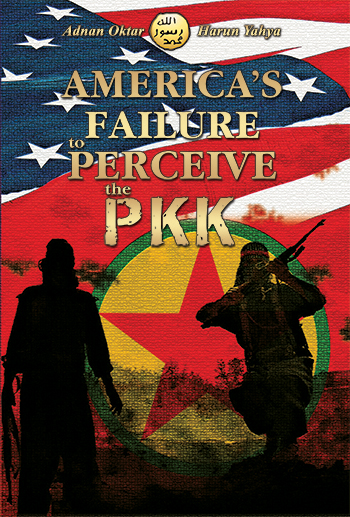
DOWNLOAD THE BOOK
CHAPTERS OF THE BOOK
- Introduction
- Chapter 1: Evangelicalism and the Middle Eastern Axis
- Chapter 2: A century-old objective: The desire to break up the Middle East
- Chapter 3: The Desired Outcome of The Treaty of Sevres: Great Kurdistan (1/2)
- Chapter 3: The Desired Outcome of The Treaty of Sevres: Great Kurdistan (2/2)
- Chapter 4: The perception of PKK in the West
- Chapter 5: What kind of danger is Turkey facing?
- Chapter 6: How should Turkey act?
- Chapter 7: Understanding our Kurdish brothers’ problems
- Chapter 8: The time for the salvation of the world is near
- Conclusion
< <
5 / total: 11
Chapter 3:
|
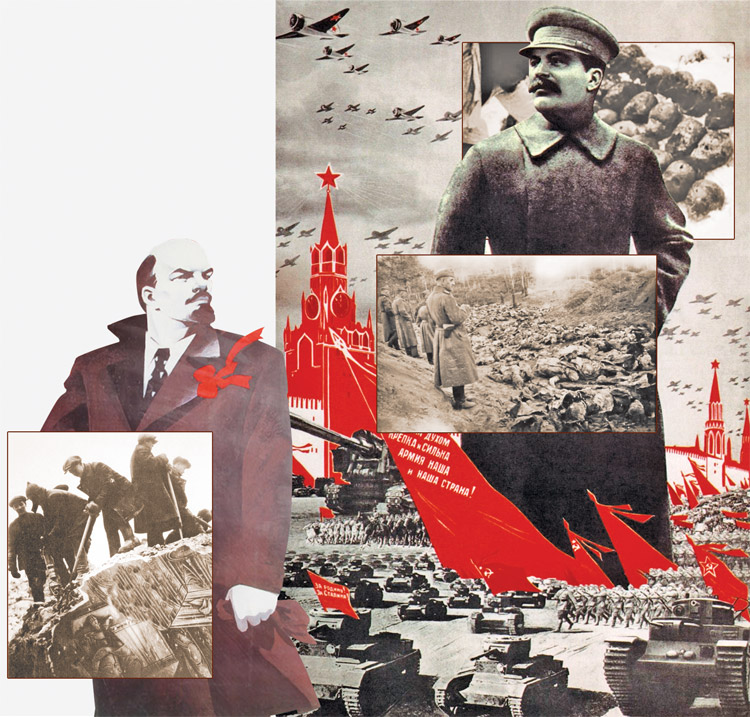
|
|
Lenin and Stalin were the bloodiest communist leaders ever. The small pictures show people slaughtered by these two dictators. Öcalan declares he will follow the same path, by saying, ‘I am the Lenin of this century’. |
|
Stalin, who said, "We engage in anti-religious propaganda, and will continue to do so”, once supported the Church for tactical reasons against the growth of fascism in the West. Yet in practice communism was entirely based on the destruction of places of worship. Left: The Georgievsky Church in Gorky being demolished by Bolshevik militants. |
Astonishingly, that same Stalin who spoke of the need to employ anti-religious propaganda against all faiths also signed an accord with the Russian Orthodox Church in the first years of the Second World War. Permission was given for tens of thousands of churches to reopen and for the reconstruction of the church hierarchy. In addition, Muslim sharia was permitted in the south of the country, Buddhism was supported in the east and there was strong opposition to anti-Semitism. There was but one reason for that interesting initiative; to eliminate fascism, a growing threat to communism in the Second World War and to gain support for the fight to defeat Hitler. Stalin made use of the influence of the Church in particular for the sake of opposing Nazism for a long time.
Lenin embarked on a short-term change of economic policy and followed capitalist principles in order to revive the Russian economy that was fast-approaching collapse and to attain the levels of prosperity in capitalist countries. Under this new system, known as the New Economic Policy (NEP), a policy was adopted that allowed small businesses to continue with the idea of making profits, just as under capitalism. The Bolsheviks regarded the NEP as a temporary move, and practices taken from capitalist economies within the NEP were criticized within the party. The NEP, which was diametrically opposed to the communist concept of economics, was adopted as a necessity and abandoned again once the requisite economic progress had been made. This tactic can be seen today in China’s policies toward Hong Kong.
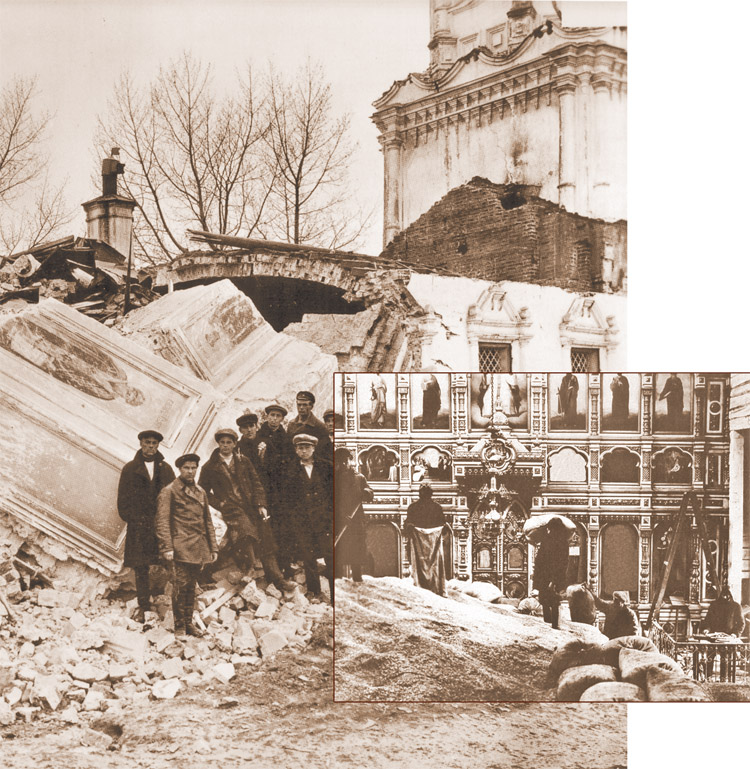
|
|
The Georgievsky Church in Gorky following its demolition by the Bolsheviks. Lower right; A church in Russia being used as a warehouse. |
Another example of communists supposedly changing their stripes and taking a step backward can be seen in their attitudes toward the family and the state. As is known, communism is strongly opposed to the institutions of the family and the state and regards both as major obstacles in the fight for a return to a communal society. Nonetheless, communists generally behave tactically and say that a strong state is essential in order to eliminate the institution of the family and the family needs to be strengthened first in order to attain a strong state: They therefore take a step back and strengthen the family first. That results in the strengthening of the communist state, after which the institution of the family completely disappears. The next stage is the total elimination of the state, which is much easier for the communists in a society that no longer has any familial or religious family values.22
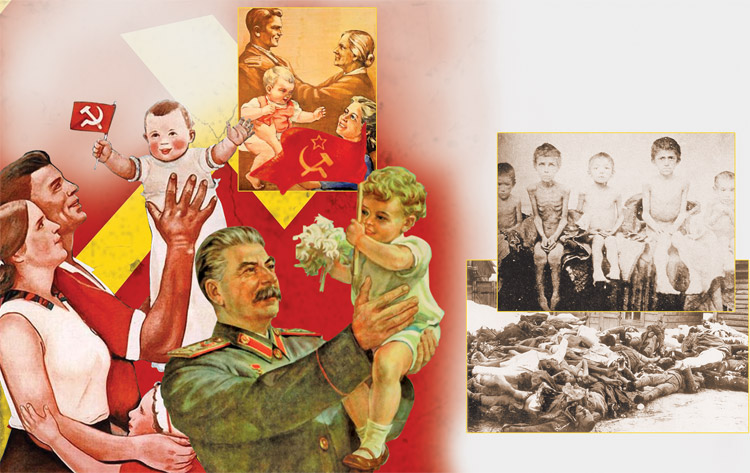
|
|
The most important communist tactic involves pro-family propaganda, to which communism is in fact absolutely opposed. This propaganda accompanied by smiling faces in communist posters is solely intended to strengthen the communist state, followed by the total eradication of the family. |
The communist tactics employed by the PKK
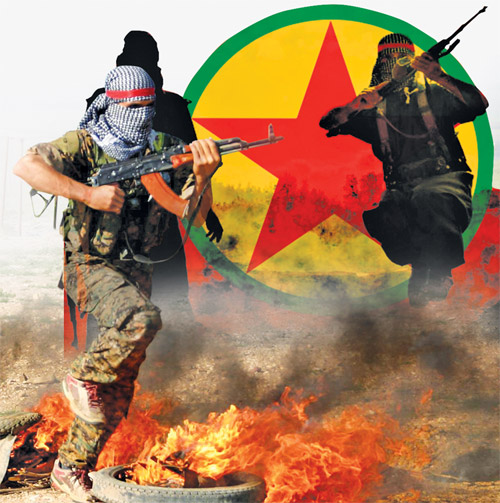
|
Communist tactics have generally been implemented resolutely by communist leaders and regarded as essential to the permanent installation of communism. To put it another way, all possible means have been used for the sake of establishing a powerful communist state. It was obvious that Stalin would never support the churches and that Lenin would never allow a capitalist economy. But when circumstances so demanded, a mask was donned with the very greatest expertise.
The same tactic is now being employed by the PKK. The PKK realized that the way to establish a communist Kurdistan, the first stage in the objective of a communist world state, was to draw closer to the West. It is perfectly well aware that maintaining an explicitly communist identity will provoke a reaction from the USA, and that will inevitably end in failure for them.
The word that is constantly being reiterated in the scope of this tactical change is “autonomy”. The term, which is in fact totally condemned in the Manifesto, is now employed day in and day out. Meanwhile, references in the Manifesto to the destruction of the Turkish Republic being essential for the establishment of a communist Kurdistan are glossed over; the organization is well aware of the fact that the term “communism” will never be openly supported by the West. Autonomy, however, is a highly emotive word for the USA and Europe; it also bestows on the PKK the entirely false impression of being “an organization striving for the liberation of the Kurdish people” in the eyes of the West. It is expected that the West would consider this demand as a requisite of democracy and would certainly support it.
When efforts to familiarize the Turkish public with the word autonomy failed, endeavors turned to a policy of softening. Proposals we have been hearing frequently as of late, such as democratic autonomy, canton and democratic confederacy are discussed as a part of the tactical methods employed by the PKK.
Furthermore, although the organization is fiercely opposed to the state system and is organized around the aim of destroying the state, it has changed its language and suddenly began speaking of the Turkish Republic as a guarantor of its own existence. This is in fact the best-known of all the communist tactics. In order to eliminate the institution of state, they have put the plan of firstly being under the guarantee of a strong state, into practice. Autonomy, as the first stage of the end goal, of course requires the presence of the Turkish Republic as a guarantor. In that way it imagines that the Turkish state will serve as the main source that will provide money, arms and infrastructure for them. It plans to establish an army, with money from the Turkish state, which it can subsequently employ against it. The PKK and its supporters are for that reason constantly speaking of the importance of the existence of the state. The true purpose, however, is once it has grown stronger and become a proper state to destroy all the countries around it, including the Turkish Republic, and to continue in that way until it achieves its ultimate aim of establishing a global communist state. All this talk is therefore nothing more than a tactic.
Other tactics employed by the PKK after its adoption of an imperialist mask involves the use of women, the family and religion. Let us now look at these tactics under separate headings:
1. Women under a mask of imperialism
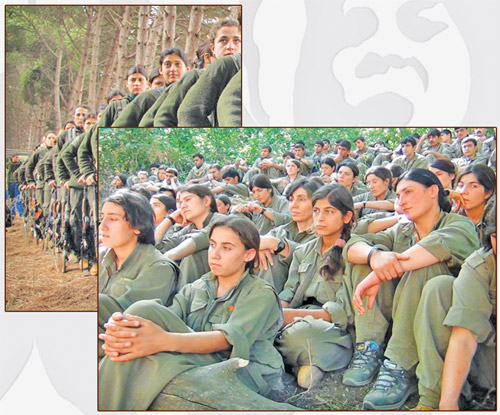
|
|
Women, once described as ‘an element of corruption’ by Öcalan, were employed as propaganda tools as required by the imperialist mask donned by him. Yet the organization is in fact a trap for women, who are constantly repressed. |
Until the 1990's, during the time the PKK openly carried out its Marxist- Leninist ideology, it regarded the family, religion, tribes and women as factors deleterious to its ideology. In the view of the organization, religion and the family, which it regards as the primary institutions of colonialism, had to be eradicated. That is why families, religious officials and tribes became an important area of struggle for the organization. Large numbers of religious officials were killed, and war was declared against the tribes.23 In his first writings, Öcalan expressed serious contempt for women as the result of his Marxist-Leninist line, and even described women as elements in family that “bring men down and make them degenerate”. Indeed, he never favored the presence of women inside the organization over concerns they would impair men’s ability to fight and would damage the atmosphere within the organization. 24
At this point, having a look at Öcalan's real opinion about women, particularly Kurdish women, would be entirely appropriate:
The bodies of the majority of Kurdish women are dead, rotten, cold and very graceless. Their physical form is a little bit like this, their souls are dull. They lack intellectuality… They are unable to repeat words not even as much as a parrot does. 25
However, as we have already seen, the 1990s were a time of splits within the organization, when it was weakened and shrank in size and suffered severe losses. This important cause of a change in tactics also meant that the PKK needed to introduce a change on the subject of women. The organization issued a sudden declaration, and women began being admitted. In 1996, at a time when the organization had been shrinking and losing popular support, it first used women in suicide attacks. 26
The basic reason why the organization, which was staring defeat in the face, started admitting women was to use them as female fighters to encourage male terrorists. With the female fighters it brought into the forefront since that time, the PKK has opened the way to a form of rivalry, and male fighters on the point of abandoning their links to the organization have been encouraged to stay.
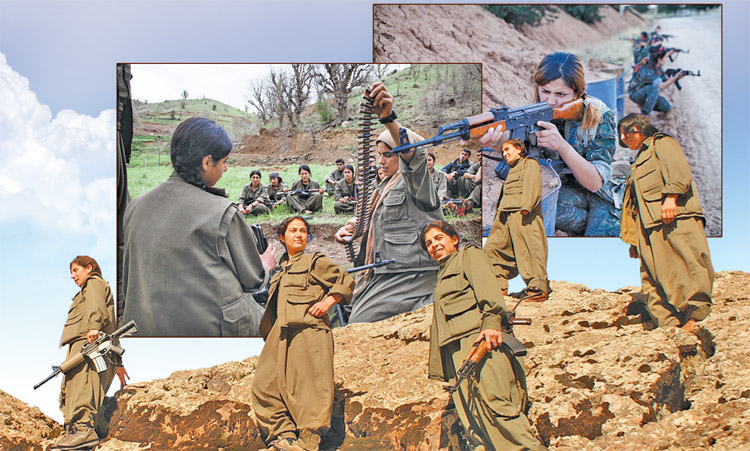
|
|
The real aim behind the admission of women to the terror organization is for women to be used for the purpose of encouraging the male terrorists in the PKK, which was facing the threat of complete annihilation. Women were used in suicide attacks solely in order to encourage the men. |
Indeed, the level of use of women in suicide attacks is much higher in the PKK than any other terrorist organization in the world. Women are responsible for 55% of suicide attacks carried out or caught before being carried out.27 Through various deceptive means, women became the pawns of this Marxist organization.
From that time on, the PKK has made women a very vital part of its imperialist mask in a variety of different ways. It has managed to portray itself as an organization that discusses and values women’s rights in the Middle East, where women are regarded as second-class citizens as a result of feudal views and a conception of Islam disseminated by peddlers of nonsense. This is a very sensitive spot for the West, and the PKK has made the most expert use of it. In the eyes of the West, it appears to be the only community that even mentions women’s rights across a vast swathe of territory. This is the mask, the stratagem, of the PKK that today most deceives Western writers who are thoroughly unacquainted with the movement.
Öcalan, who in fact regards women as a degenerate, cancerous element and the main component of the nuisance that is the family, a concept which he regards as a hurdle that needs to be overcome, suddenly developed a theme of freedom for women as of the 1990s as the requisite of this tactical change. He depicted women as “a land needing to be liberated” and produced the slogan “free woman means a free Kurdistan”.
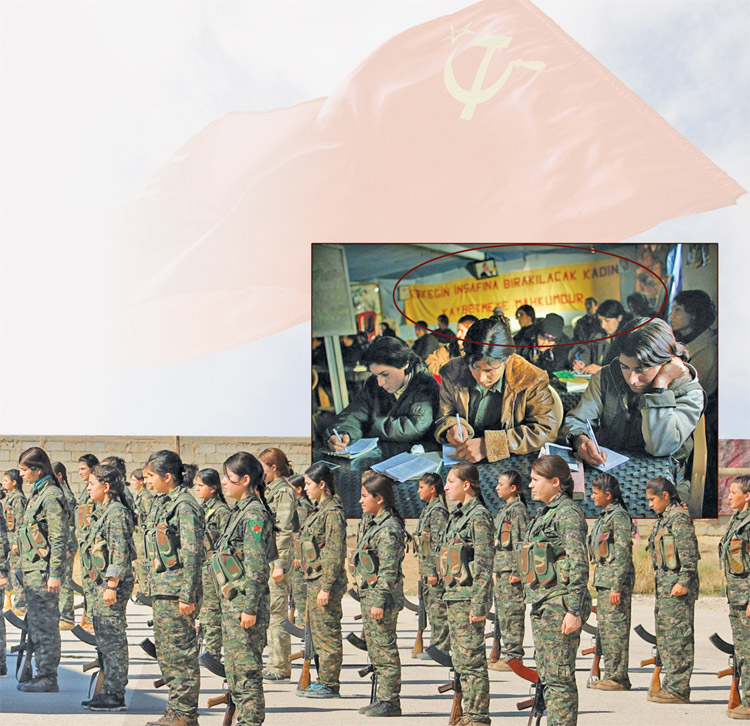
|
|
When the need arose in the organization, Öcalan attempted to win women over, having previously described them as ‘an element that corrupts men’, with slogans such as ‘A free woman for a free Kurdistan’. In the light of such powerful propaganda, many women seeking to escape the feudal system believed it, but many of them subsequently regretted it when they saw the true face of the organization. |
The publications of the University of Illinois speak of this change within the PKK as follows:
Until the 1990s, as women had not become active members of the PKK movement, the main focus was on men, and women were regarded as “weak people who cannot be trusted”. However, as the involvement of women in the movement increased, the discourse of Öcalan as well as the PKK in general started to emphasize the role of the women while criticizing the traditional, “feudal” virility of Kurdish men.28
It needs to be made clear here that of course the freedom and superiority of women are things to be advocated, and are actually one of the fundamental elements of Islam. The Middle East is by and large very backward in that context, the main reason for this being that Islamic lands have turned away from the Qur’an in favor of superstitions. The logic of the peddlers of superstitions has led to the most extraordinary degeneracy and disaster, not just on the subject of women, but also in terms of quality, democracy, war and peace, art and science. The most important point that needs to be considered here is that true Islam is a way of thinking that exalts women and offers the most perfect description of art, science and democracy. Those who have been led to disaster have turned away from the true Islam of the Qur’an and live by a false religion of superstition. (For more information see “Bigots’ Hatred toward Women” in the book Bigotry, the Dark Danger by Harun Yahya.)Global Masculinities and Manhood, What makes a man within his own culture, University of Illinois Press, 2013, p. 95
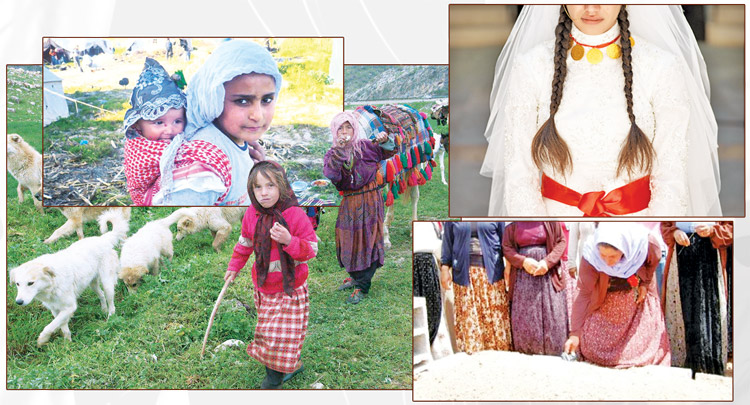
|
|
The presence in the Southeast of Turkey in particular, of factors such as refusal to send girls to school, marrying children off at a young age and traditional killings has always been used as a card by the PKK, and there has been intense propaganda to the effect that women who head to the mountains will be ‘free’. Many young women up in the mountains are either with the organization in order to free themselves from the feudal system or else having been kidnapped by it. The PKK is still kidnapping young people and children in the Southeast of Turkey. |
It will also be of use to clarify the following point; it is certainly true that in those times in particular, horrifying customs such as not sending girls to school, marrying them off at an early age, regarding them as worthless and unimportant and even so-called honor killings were widespread in the Southeast of Turkey and the PKK has used this to spread the idea that “if you take up arms, then you will be free”. The majority of young girls in Kurdish villages openly state that they have been deceived by this image of freedom in order to escape oppression by the family or the tribe in general. The number of those who managed to return among the ones who have regretted their decision is very small, because they have generally been threatened or even executed by the organization.

|
|
Women must be completely free, and be well-groomed and at liberty to dress as they please. Anyone who advocates real Islam, meaning the moral values of the Qur’an unadulterated by any superstitions, will also advocate freedom for women. Turkey must be in the vanguard of this, and must not leave the initiative to a perfidious terror organization such as the PKK that seeks to make a good impression on the West. |
Since Turkey is both an Islamic country and a democratic one, it must lead the way on the subject of attaching value to women and must act as a perfect role model for the Middle East. It must not leave the way clear for bloody terror organizations that have donned a mask for the sole purpose of looking good to the West. It must tell the world how the most perfect, just and proper measures concerning women and democracy are to be found in the Qur’an. When this is made a reality in both the east and the west of Turkey, the way will be clear for the Middle East to escape this scourge and Turkey, as an Islamic country that puts these into action, will have shown the Middle East the true moral values displayed by the Qur’an.
What do female members of the PKK say?
The main reason for our concentration on this change of language and behavior on the subject of women on the part of the PKK is to expose the organization’s hypocrisy. The PKK has adopted this talk and these policies regarding women simply because that is the easiest way of meeting its needs for militants and looking good in the eyes of the West. Yet the words of women inside the organization in fact reveal the very opposite of this.
Necati Alkan has interviewed a large number of female PKK members and has produced an important collection of these. Some of these read as follows: The female PKK member code-named Zelal says:
I criticized Öcalan for his attitudes and policies. I criticized the organization’s internal democracy and people’s backwardness... They put me in jail for two months. When I came out, Öcalan accused me of speaking against him, in the presence of 500 people in a training area and said ‘One has no right to say anything against a deity. If you speak against a deity, you will be struck down.’ In other words, he ascribed divine status to himself. I wanted to leave the organization, but they threatened me with death. I had never been so terrified in my life. 29
The woman code-named Bese, who was active in the PKK during this time of transition, says:
When I joined the PKK I was up in the mountains. I had a gun, so I thought I was free. But as time passed, I realized this was not freedom. Because I had no identity of my own. I could not freely express my ideas or criticisms. When I wanted to leave the organization, I was not able to do so. (2008) 30
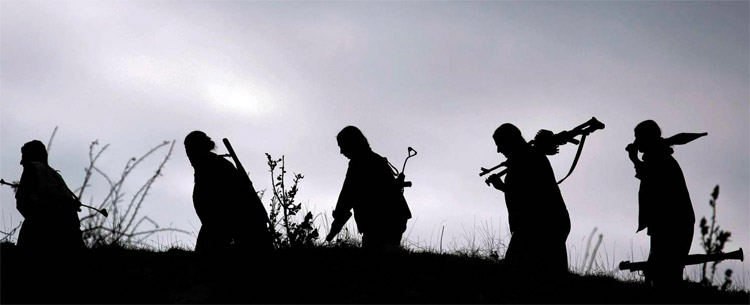
|
The woman code-named Leyla says:
Very little was done in the name of women’s freedom within the PKK apart from symbolic and very superficial things. And what was done in fact damaged women’s freedom a bit more. Because it was Öcalan, a man, who developed an ideology on behalf of women, organized them and took and implemented all decisions. I was personally free before joining the PKK. But in the PKK I had and could have no opinions regarding today or tomorrow.” (2009) 31
Necati Alkan said the following in his book on the basis of his observations and interviews:
Women given various tasks and roles by the PKK after the 1990s became the main force keeping the organization on its feet. All the women interviewed stated that if that force were to quit the organization, “its organizational structure would collapse”. Ronahi’s words stating that, “were there no women you could not keep the men in the organization”, Beritan’s statement saying that “the men stay up in the mountains for the women”, Revşen’s opinion stating that “if women left the organization nobody would stay up in the mountains” and Pelin’s words saying that, “If the women left, the men would not stay up in the mountains for a second” are all significant in that context.32
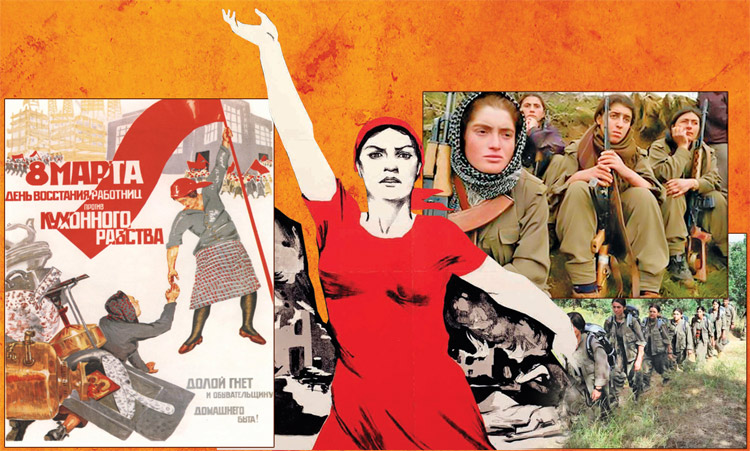
|
|
A poster intended to serve communist propaganda about “freeing women from servitude”. The PKK makes propaganda about freeing women from servitude. Yet communism is a system of ideas that regards women as a worthless common chattel and that despises them as part of its ideology. It is therefore impossible for the communist system to elevate women. |
Alkan’s analyses suggest that women, regarded by the PKK as “slaves to be freed” in the early years, began being regarded as “comrades” in the 1990s when they started taking part in armed attacks and as “goddesses” after 1996, when they started taking part in suicide attacks. It appears that, despite all the talk in their praise, in practice, women in the organization were despised by the men, not regarded as equals and not valued. Many women concerned by the difference between the organization’s words and actions and who saw the discrepancy between its promises and deeds, sought to leave the organization during this period. Some fled, but others were caught trying to escape and declared to be traitors and punished. 33
This statement by Neval, who spent many years in the PKK, is particularly significant:
All measures in the name of women’s freedom inside the PKK were introduced as the most basic dynamic of the PKK system. One of the main elements of the system that Öcalan wished to create was female activity. Note that throughout the history of the party, and particularly after 1990, Öcalan based his system and identity on the power of women to a significant extent. While putting women in the balance, he actually benefitted from that more than women did. (…) Thousands of Kurdish women who took to the mountains and suffered numerous hardships in the name of the revolution and freedom, for their country’s sake, were organized for the interests of Öcalan’s system but in the name of “liberty”.
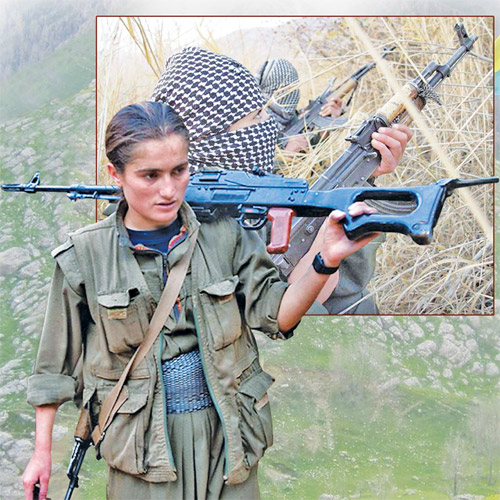
|
People speak of Öcalan being on the side of women. I would like to clarify that: Apart from a few gestures required as the prestige of being the Leader, it is not possible to speak of Öcalan generally favoring women. But there is an even worse and unjust system concealed behind this. What Öcalan actually established was an elite female group that could act as his mouthpiece and reinforce his own control through women.34
The punishment and execution of women engaging in criticism inside the organization, or wishing to leave it, is a fact that summarizes the reality of women in the PKK. The most important example of this was the execution, at Öcalan’s command, of the female militant code-named Semir who sent her criticisms of internal organization within the party to Öcalan himself. According to Necati Alkan, through the execution of Semir, Öcalan neutralized the first direct revolt against his authority and issued a challenge to future potential opposition movements in the person of Semir. Semir was not the only example. Saime Aşkın, who supported Semir during the dispute, was also killed. This policy is still in force today, and those who criticize Öcalan’s practices are identified as those who carry the "personality of Semir” and are subjected to similar punishments and executions.35 The reality of the terrible executions within the PKK will be described in detail in due course.
It is of course no surprise that, despite all the deceptive talk about women, female members of the PKK have realized that they were in fact “only there to be used”. Women have always been regarded as valueless entities in communist systems. Moreover, there is no question of any value being attached to women in the communal system believed to have existed once, but which in reality never did. Under the desired communal system, women are regard as communal property, in the same way as all goods and objects, food and children. Since communist ideology is an unpopular one, particularly in the present day, they do not openly talk about communal use of women. However, this is the inevitable consequence of the elimination of the institution of the family, and this is the actual objective. A concept of society in which neither marriage nor the family have any meaning inevitably implies the common use of women, children and material properties. In a society in which everything is regarded as property to be enjoyed communally, women will obviously have no unique “value”.
2. Religion under the mask of imperialism
(Surely God and the Qur’an are beyond what stated below)
Perhaps the most important of the elements in the PKK’s imperialist mask is religion. Until the 1990s, the Leninist PKK entirely rejected religion. After that, however, it began using religion as one of the most important ways of concealing its communist identity. The key point in making a good impression on Western states was to adopt a different policy toward religion, to which communism is fiercely opposed. The PKK began using a mask of religious devotion in a particularly effective manner after the 1990s.
Before turning to the details of this change, we need to understand the PKK’s basic attitude toward religion.
As we have reiterated several times, the PKK is a communist organization and communism appeared together with the ideology of atheism, and all communist leaders have in fact engaged in atheist propaganda. The communist state of the future must have abandoned the concepts of religion, ethics and the family. Öcalan, who said, “What Lenin was to socialism in 1900s, I am in the 21st Century”, openly expressed his ideas on the subject of religion prior to the 1990s, before he donned an imperialist mask, in other words. Some perverse statements about religion from Abdullah Öcalan read as follows (surely God and the Qur’an are beyond this):
- I went through a serious philosophical depression in high school. I declared war on God and became semi-divine when I emerged victorious from that war. 36
- Monotheistic religious ideologies are political ideologies from start to finish. Concepts such as religious speech, God, prophets and angels are the political literature of the time. 37
- God is a kind of medieval feudal manifesto, its basic law and declaration. 38
- Prayer itself is in general terms a piece of theater. 39
- Regarding the Holy Qur'an: “The third great version of the Sumerian mythology carried out at the ideological identity level, one that has undergone a transformation."
- We have nothing to do with religion. Our people must break away from God and ideology. I broke away from God after a long struggle. I overcame God. And was thus able to become Abdullah Öcalan. Islam has given our women nothing. We will replace it with socialist morality. "
- When we look at progress in history, we see quite clearly that they sought unity and power through the worship of GOD. Concepts such as the beloved servant going to paradise are the fantastical elements of the matter, the literary bits.
Leninism has been the ideology of Öcalan and the PKK right from the beginning. Lenin described the perspective toward religion in the Marxist ideology that he practiced as follows:
Marxism is materialism… This is beyond doubt. We must combat religion. That is the ABC of all materialism, and consequently of Marxism. But Marxism is not materialism, which has stopped at the ABC. Marxism goes further. It says: “We must know how to combat religion, and in order to do so we must explain the source of faith and religion among the masses in a materialist way. The combatting of religion cannot be confined to abstract ideological preaching”.40
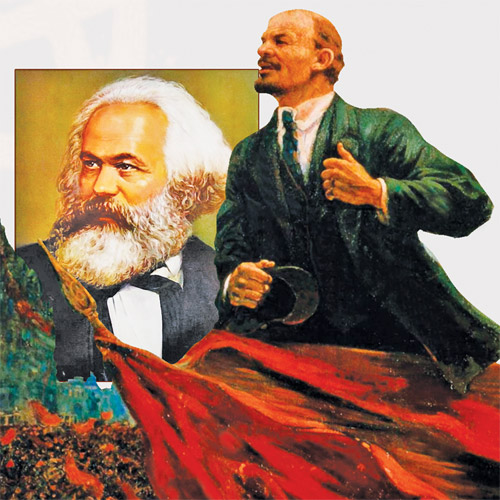
|
|
Marx’s idea of communism that was based on violence and disregarded religion and the family was put into practice in Lenin’s savage policies. |
Marx described religion as a tool in the hands of the ruling class used to lull the people into compliance; it was referred to by Marx as “the opiate of the masses”. Öcalan adopted the same view of religion in the light of the ideology he followed, regarding religion as a tool of the bourgeois and the state, which he regarded as a colonialist power. Indeed, the founding manifesto of the organization refers to Islam as an agent of colonialism and as a Trojan Horse installed among the Kurds with a covert influence over them. The metaphor of the Trojan Horse appears as follows in Öcalan’s own words on page 32 of the 1994 edition of the “Manifesto of the Kurdish Revolution”:
The Kurds have been subjected to foreign colonization in the spiritual sense as well. Islam is like a “Trojan Horse” whose role is to prepare for national denial in the heart and brain of the Kurd and to conquer the citadel from the inside. 41
As a result of its Leninist perspective, the PKK’s main idea was to establish a system under the dictatorship of the proletariat, and believed that the dictatorship of the proletariat could primarily be possible by the spread of irreligion. These words of Öcalan’s need to be borne in mind in this context, “The Kurdistan Revolution is part of a Revolution of the World Proletariat that began with the October Revolution and is becoming increasingly strengthened through the national liberation movement”.42 The primary method of imposing the hegemony of the proletariat for the PKK is without doubt through armed struggle but the first condition for this mentality to install itself within the PKK has always been regarded as an education intended to turn people away from religion. These words of Öcalan’s make this very clear:
[The] Proletariat could neither be able to realize a strong movement nor come up with a pioneering organization before the formation of dialectic historical-materialism. It is no coincidence that the great masters of proletariat have started this task from philosophy and brought forth the sturdy point of view of the proletariat by criticizing religion… 43
As all these statements show, both Lenin and his follower Öcalan failed to comprehend the beauty and warm spirit of religion and the moral values that God speaks of, for which reason they always imagined that the primary solution was to declare war against religion. The basic method employed by the PKK has therefore always been to provide a false philosophical education. That philosophical education is based on dialectical materialism, and along with that, contains an anti-religious discourse. This form of education is still employed within the PKK today.
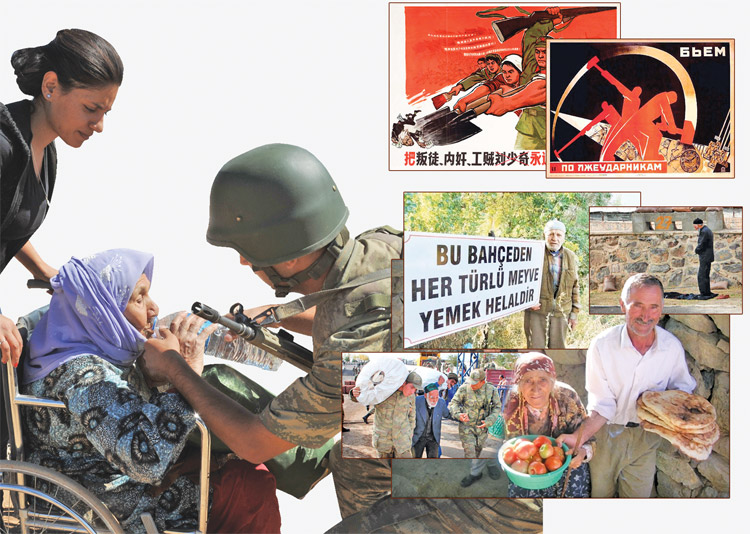
|
|
The inhabitants of the Southeast of Turkey are the people of love with the loftiest moral values. It is impossible for them to adapt any other lifestyle than Islam and to live by the cold and loveless spirit of Marxism. "EATING ANY KIND OF FRUIT FROM THIS GARDEN IS HALAL [LAWFUL]" |
Yet this is a waste of effort in the Southeast. Our people living in the Southeast of Turkey have fully grasped the warm and loving spirit of Islam. They are a strong people who embody the Islamic spirit of peace, affection and altruism to perfection. It is impossible for the people of the Southeast to adopt any other way of life than Islam or to abide by such a cold, terrifying and loveless way of life as Marxism. In fact, the PKK had to admit two very important facts in the early 1990s, when it began suffering serious losses: 1.) The Kurds are a religious people, and will therefore never support any irreligious ideology unless they are compelled to do so and 2.) the way to win the support of the West in the Middle East, wracked as it is by radicalism, is through talk of moderate Islam.
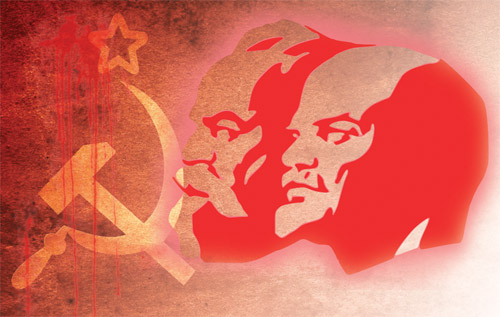
|
|
The fact that the Kurds refused to renounce their religion and adopt a Leninist way of thinking forced the PKK to change its tactics. The PKK, which explicitly rejected all forms of religion, began softening its language toward it, as required by its new mask of imperialism. But in fact, the PKK still intends to eradicate all religions. |
Journalist and writer Mehmet Metiner says the following in the context of this first fact:
I maintain that at that time (the years of its foundation), had the PKK not followed a socialist-atheist ideological line and had it not adopted a policy that directly reckons with the Kurds’ religious beliefs and values, there is no doubt that it would have had the opportunity to attract a far greater number of people... Because the Kurds have never, throughout the course of their history, renounced their faith or their national identity. 44
The fact that the Kurds would never abandon their faith obliged the PKK, which was unable to attract support, to adopt a religious guise.
The second point is that either the PKK really had the effect it desired in the West, or else the West wanted to believe this out of self-interest. Some Western commentators point to the Middle East becoming a bloodbath because of radicalism as the reason for that and regard PKK an ally that speaks of religion in moderate terms – either unaware that it is a communist organization or else totally ignoring that fact – as being highly suited to their own norms. Indeed, the French writer Bernard-Henri Levy makes this very clear in his own statements concerning the PKK: “...one finds a level of gender equality, a respect for secularism and minorities, and a modern, moderate, and ecumenical conception of Islam that are, to say the least, rare in the region.” 45
Note that the three factors cited, women’s rights, democracy and a moderate concept of religion, are things that the West has always wanted to see in the Middle East. These key and misleading factors have been carefully selected and used by the PKK as part of a tactical change. The West, on the other hand, fondly imagines that it has gained an ally with just those characteristics in a region of great strategic importance, one that it can make excellent use of. The fact is, however, that the PKK is simply deceiving the West.
A religious mask well suited to an appearance of Kurdish nationalism
After the 1990s, the PKK changed its spots and began constantly speaking of “ethnic movements”, “local elements” and “crisis of identity oppressed under a majority”. The reason for that is that these factors have a permanent presence on the EU and U.S. human rights agenda. That is why the PKK is playing the Kurdish card. And in order to play that card right, they decided to use Islam – in their own twisted minds- which the Kurdish people are identified with. The fact is, however, that the PKK is a communist organization that has nothing to do with Kurdish nationalism. Indeed, it is always the Kurds that have been targeted by the organization, and organization carried out the real slaughter on the Kurds. As this book reiterates from time to time, it is important to properly distinguish between the PKK and the Kurds.
Burhan Semiz describes this change of guise in the PKK in order to better approach the local people as follows:
Religion, and specifically Islam, heads the list of the superstructural institutions that the PKK rejects, either directly or indirectly, depending on the circumstances, and that it regards as inimical. The PKK, identifying religion and Islam as an agent of colonialism, exhibited a hostile attitude to these values of society before and after its foundation...46 The PKK began realizing the importance of bearing societal values in mind, as of the early 1990s and in order to avoid a clash of values with the local people of the region, it adopted a new language concerning the family, women and cultural values, and particularly Islamic–religious values. 47 The PKK’s failure to attract the desired level of grass root support in an organizational context, and the Kurds opposing the organization by tending to support other groups, such as Ilim, Menzil and Hizbollah, caused Öcalan to revise his classic language concerning Islam and religion in the 1990s and led to greater importance being attached to the subject.48
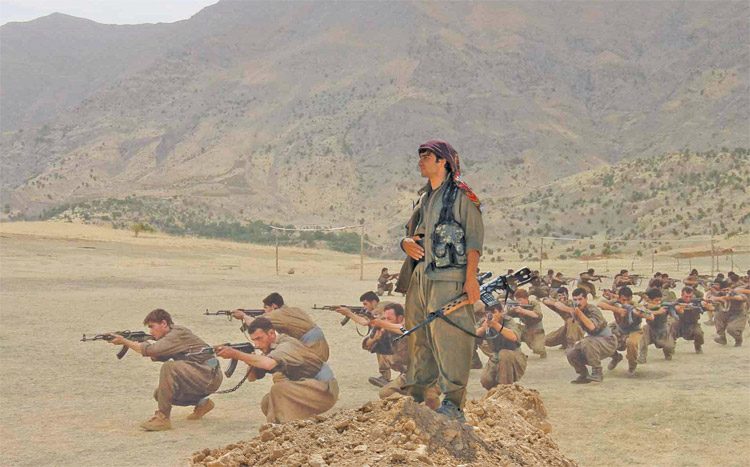
|
Within this new guise, Öcalan explicitly stated that he could even regard radical religious movements as allies.
Friendship with opponents of the established order, especially religious movements, is desirable. A friendly approach to religious ideological movements based on Iran can be adopted. These should not be regarded as enemies, because they seek to overthrow pro-Western regimes by following a radical line. We must be in a state of competition and solidarity with them, particularly as we implement our own religious policy. 49
Öcalan sought to implement this change of language within the principle of gradual familiarization without an instantaneous and complete diversion from materialist elements. He sought to implement this through a strategy he dubbed “The Revolutionary Approach to the Problem of Religion”. Öcalan attempted to express his attitude toward religion in various forms, and began adopting a more moderate language in terms of Islam. Instead of his earlier language which completely excluded religion, he began concentrating on the social functions of religion, while still preserving his dialectical and materialist views.
This change of tactic has been included much more widely in general statements by the PKK in recent years. Various politicians and actors known for their religious natures have been employed, and the PKK has gradually began being associated with the concept of “moderate Islam”, in such a way as to influence the West. As a result of this false representation, the West imagined that it now had a group that would be effective against the growing numbers of radicals in the Middle East. The reality is very different, however. The PKK’s policy of drawing closer to Islam is merely tactical, as described by a former member of the organization, Demirkıran:
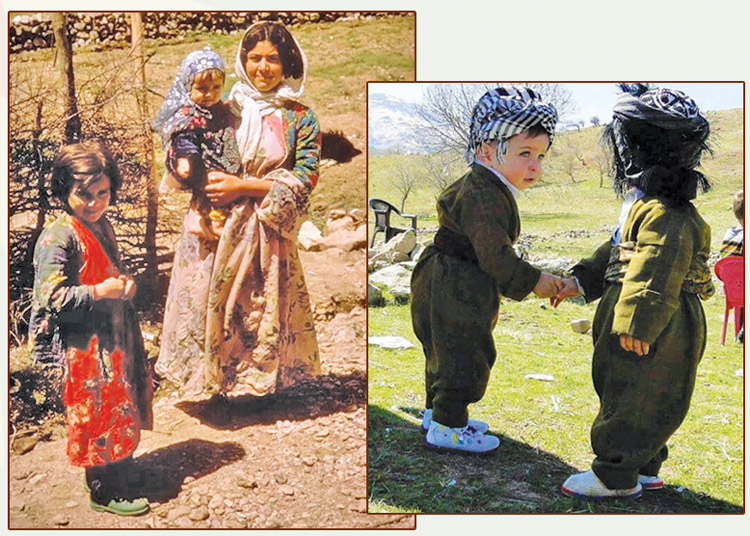
|
|
The religion, family values and spirituality that the communists seek to destroy are values that the people of the Southeast Turkey will never forego. |
The day after I joined the organization I realized that it has no religious belief. Because, it had a Marxist-Leninist structuring. That really saddened me at first and caused me to be distressed for a long while. Yet they still tried to relieve me of my faith, as well. There was no question of my not rejecting religious belief when everyone else was doing so. Although I did not deny the faith internally, it was not possible to externalize my faith. Surely all of us were irreligious. 50
These comments concerning Hüseyin, a member of the organization aged in his mid-to-late 50's who had been an imam before joining the PKK for various reasons, are also noteworthy:
When Uncle Hüseyin first came to the camp he was performing his prayers as well. Then he saw that nobody else was praying, and that moreover everyone was against religion, and he gradually ceased praying. He explained this by saying, “Now we are at war. We can pray later”. This is how an imam became estranged to his religion in the PKK, which was funded on Marxist theory. Other people, like us, had already long since forgotten God. 51
The PKK, which has adopted a mask of religion in order to deceive our Kurdish brothers and the West, still dreams of establishing an atheistic, communal system from which the state and the family have been eliminated. Indeed, as we shall be seeing in detail in due course, the KCK state system established by the PKK under the rubric of urban organization exactly meets that communal description, and openly expresses it. For that reason, it is astonishing that the PKK’s religious talk is so deceiving to the West and even for some circles inside Turkey. These people describe a community that wishes to destroy all forms of religion as “moderately devout” and as a model for a Middle East, a region molded by religion.
The Turkish education curriculum unwittingly supports the ideology of the PKK
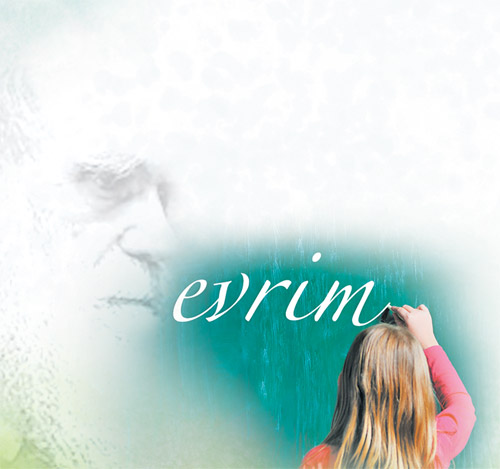
|
The point requiring attention here, and the most worrying thing in terms of the Turkish state and nation, is that the Turkish education curriculum unwittingly supports the ideology of the PKK. As we have already seen, communism, the basic ideology of the PKK, derives from Darwinism and Darwinism, or the theory of evolution, is the worst deception in the history of mankind, imposed by force on educational curricula across the world by a cunning dictatorship. That deception has particularly been exposed by 21st Century science. More than 500 million fossils show that living things have remained unchanged for millions of years. Molecular and biological evidence has revealed that no protein can ever come into being by chance. Consequently the theory of evolution is invalid in the scientific sense. Yet thanks to pressure and deterrent policies from the Darwinist dictatorship, state systems have come to adopt this deception and made the theory of evolution a fundamental compulsory subject in schools and universities. The mainstream media also instruct their own broadcasting and publishing bodies accordingly.
Turkey is one of these countries. Although 99% of Turkish people are religiously devout, evolution plays a primary role in the Turkish educational curriculum, as it does in all other countries. Our children are taught evolution from a very early age, as if it were something that had actually happened. They believe that the world is a battleground where the strong vanquish the weak, and the subconscious idea that everything comes into being by chance turns them away from belief in God. Religious knowledge based on a traditional approach is taught in religious studies classes in schools. However, children are also inculcated with the false idea that God does not exist in all their other classes (surely God is beyond that). Therefore, under the effects of this false infrastructure, a child can very easily later be influenced by ideologies based on Darwinism, such as communism and fascism. Even if he does not fall under their spell, he will still lack the strength and ideological equipment with which to oppose these false ideologies. It is for these reasons that while the PKK provides Darwinist/communist education for its own people, the young Turks who should be striving against that are amazingly given a very similar education in public schools. One tragic consequence of this is that they are unable to wage any intellectual struggle against the PKK. The fight against the PKK is limited to the military arena, and ends in casualties because of the guerrilla war the PKK perfidiously conducts.
However, as we have said so many times over the years, the only way of fighting the PKK is on an intellectual basis. So long as that does not happen it will be absolutely impossible to completely eradicate the PKK. Negotiations and ceasefires will obviously fail to achieve results, because the killers will still be there, just simply deprived of their weapons for a short time.

|
|
Top right: A hornet preserved in 50-million-year-old amber in the finest detail right down to the present day. Top left: A present-day hornet identical to a 50-million-year-old fossil specimen. |
In order to give a better understanding of the Darwinist infrastructure of the PKK, it should be stated that Öcalan himself is a fanatical evolutionist and the ideological foundations of the PKK lie in that deception. (For more detail, see “The PKK is Darwinist” section in the book The Danger of a Communist Kurdistan by Harun Yahya, p. 111). Indeed, in giving his own foolish definition of religion, Öcalan speaks of an imaginary time in which he believes “man started becoming human”. This is a reference to the false idea of a transition from primates to human beings in Öcalan’s mind. The words that Öcalan uses are these:
Under the conditions in which the human species came into being, during the time they started to become human as a species, when they started to use their capabilities which gave them these attributes, they had to come up with a religious value, a religious thought, a religious way of thinking. They had to do this with two reasons, on the one hand there were natural forces they regarded as supernatural and on the other hand they had their own capabilities in question.52
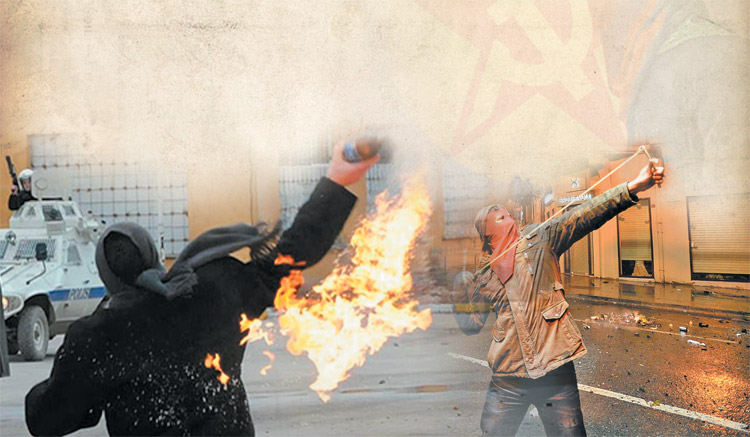
|
|
Our young people study Darwinism as a compulsory subject in public schools, and under the influence of the false infrastructure they thus acquire, it is easy for them to fall under the spell of ideologies rooted in Darwinism, such as communism and fascism, later in their lives. |
As can be seen, Öcalan, in his own mind, identifies a time when humans started becoming human and claims that the notion of religion was developed by man under the influence and fear of supernatural events. This idea can also be seen in other statements of his:
… Let us have a look at humans and consider their weakness against nature while trying to understand religion. With what will he overcome this weakness, this nakedness of his? I believe that we are not mistaken in this point: Humans, in order to make themselves ruling, in order to get rid of their helplessness, in order to appear sympathetic towards nature and to render nature understanding and of course above all else in order to make themselves sovereign, appeal to the notions of religion and God. As a matter of fact, people have their eyes on being "sovereign". As a prerequisite of this, they create gods for themselves… If we were to materialize it even further, religion is the first form of thought and psychological development in the confrontation of human species with nature. 53
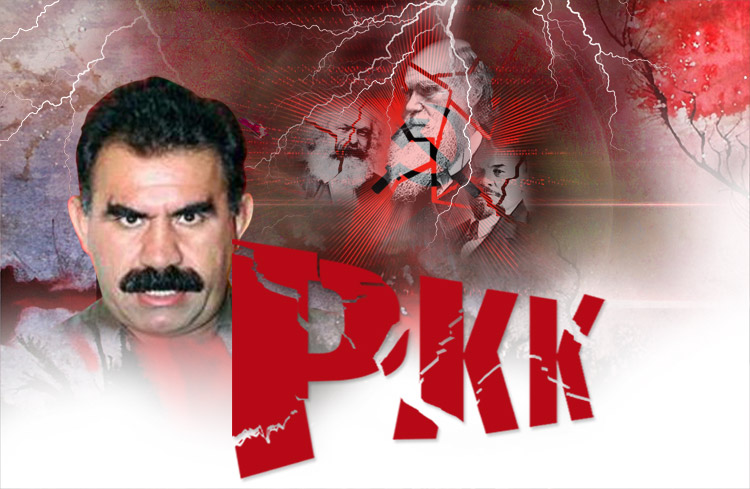
|
This is in fact a new tactic on the part of Öcalan, who until then had rejected religion entirely. He still speaks as an atheist and still backs the PKK's atheistic strategy, but also seeks to give the impression that religion is “an acceptable institution” by claiming it was a need felt by the earliest humans. He is actually using a means of fighting religion described by Lenin in the words, “... We must explain the origins of faith and religion to the masses from a materialist perspective.” He adopts a guise that seeks to account for religion in sociological terms but that does not reject it completely, and thus seeks to influence the devout Kurdish people.
Another passage from Öcalan on the subject reads:
Religion is a remedy for humans to overcome all weaknesses and to eliminate their fears, concerns and pains. And it is necessary. It is not possible to say why did the first man not reach the scientific facts, why did he fall into errors and obsessions. That is because it was not possible to act any different under the conditions of that day. In that case, a better understanding of the truth of the first man is necessary. 54
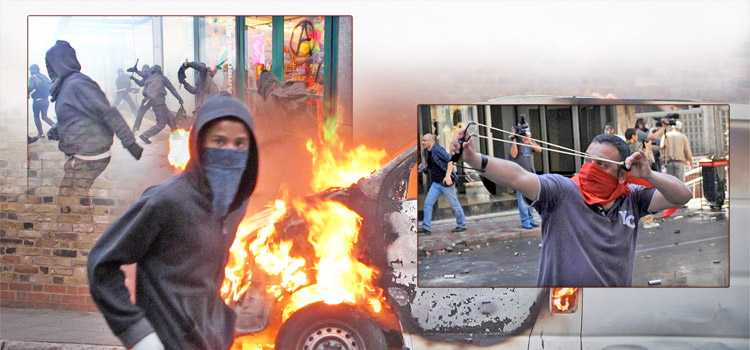
|
|
Violence and conflict have become images that we are familiar with almost everywhere in the world. The main reason for this is that the nonsensical infrastructure of the philosophy of conflict and violence, Darwinism in other words, is literally taught as if it were an established fact in schools. |
As this makes very clear, Öcalan seeks to impose the false notion of evolution on religion, which claims that nature and history evolved within a dialectic course and maintains that religion does exist within that dialectic course. Accordingly, he accounts for religion as a need stemming from fears and claims that it also evolved over the course of time. Öcalan foolishly espouses the horrifying logic which states that, “a perception of religion within the axis of God and nature ruled in the primitive communal society and with tie transformation to feudal society, the concept of religion started to be evolved and created the social foundation for monotheistic religions.”55
It is not surprising that these ideas should have an effect on some segments of society. The curriculum in Turkish schools describes religion in these terms in sociology classes:

|
In general terms, religion is a way of accounting for natural and societal events that people could not understand and which they were powerless in the face of, in terms of supernatural and mysterious forces invented by themselves. 56
It is a horrifying state of affairs that religion, sent down by our Almighty Lord as a guide to the truth and the right path from His Own Presence, should be described in our own schools as a concept “invented by people” to cope with fears caused by natural and social events. This state of affairs not only serves the interests of the PKK, but also lays the foundation for the production of atheistic communities. Lovelessness, violence and hatred will clearly enjoy free rein in societies that have no fear of God and instead believe that a struggle in nature where the strong vanquish the weak is essential. Indeed, it is no surprise that the numbers of savage killings, the murders of women, daily brawls and psychopaths are increasing all the time. Due to classes being based on evolution, students are directly indoctrinated in school with the idea that “God does not exist”, (surely God is beyond that) and come to regard violence as a law of nature. So long as they have no fear of God, neither laws nor deterrent sanctions can stop people with a tendency to violence.
Some of the expression that appear in philosophy text books in the Turkish school curriculum read as follows:
...Man is free and strong. He has no essence predetermined by God... He is an existential entity that does not come from nothing. Because there is nothing outside him. If God existed, there would be no existence and freedom. Therefore...
...If God wishes to prevent evil in the world but is unable to do so, then He is weak. If God is able to prevent evil but does not wish to do so, then He is ill-intentioned... 57 (Surely God is beyond that)
These terrifying words are used to subconsciously indoctrinate people into denying the existence of God. A child reading these words will believe that they represent information from an academic source and will grow up as an atheist. The truth of the matter is that God is Infinite and Eternal, and the universe came into being by His leave; the universe and everything in it have a beginning and an end. The fact that the universe, man and all living things were created has been proved by countless branches of science, including genetics, astronomy, physics, quantum physics, biology and paleontology. The existence of God is a guarantee of freedom, justice, happiness and peace. True evil and unhappiness are the features of an illusory world that evolutionists and materials believe came into being by chance and advances in a state of conflict.
Statements about the dialectic of history and nature from the past to the present day are in fact false philosophies fabricated in order to spread the fraud of evolution across the world. Nothing in history or nature has ever developed from the primitive to the more advanced. No such thing as the “Stone Age” ever happened in the course of history, and living things did not descended from a bacterium. Some societies in the past were extraordinary civilizations far more advanced than some today. (For more detail, see The Evolution Deceit by Harun Yahya, and, A Historical Lie; The Stone Age by Harun Yahya) Therefore, the dialectic that Öcalan and all other Darwinists seek to impose to religion is merely a deception. Yet that deception is shamelessly being taught in middle school textbooks, as we have seen.
As we have seen, the PKK terrorists are led astray up in the mountains, and our students in their schools. It will be very difficult for there to be an intellectual struggle against the PKK and its ideology within Turkey’s borders until that deception is brought to an end. As we have made clear many times, the real problem that needs to be dealt with is the PKK’s horrendous ideology. The absence of any infrastructure for an ideological struggle, and young people being deprived of any such infrastructure and raised as the prisoners of a vast deception, might result in terrible tragedy for Turkey.
Some Examples of Evolutionary and Atheist Propaganda in School Text Books
(According to the 2013-14 curriculum)
Middle School 12th-Year Biology Text Book

|
In this academic year you will learn about how life first appeared and about the changes in life forms in the chapter “THE BEGINNING OF LIFE AND EVOLUTION”
Fossils provide us clues about how living beings appeared on earth, where and how they spread throughout the world and what kind of changes they have gone through while they spread out. Information obtained from fossils and several branches of science is used to study the origin of life and evolution. (p. 199)
All changes undergone by life forms from their initial states to the emergence of present-day diversity are described as evolution. (p. 204)
As a result of the paleontological studies conducted, it has been observed that there are fossils different from each other among these layers and that the more the age of these layers increased, the less the fossils resembled to today's living beings. The results attained with the survey of fossils, reveal that some species that lived millions of years ago have undergone change in time or have gone extinct. (p.204)
Therefore, determining the evolutionary process undergone by a species is based on the observation of similarities between species and examination of fossils exhibiting such similarities. (p. 205)

|
Unit headings:
Lamarck’s Views (p. 205)
Darwin’s Views (p. 206)
Fossils are the most powerful evidence for evolution. (p. 207) Fossils enable the comparison of the similarities and differences between the living species that lived in ancient ages and today and show us what kinds of changes species have undergone. (p. 207)
Evolutionary Relations in Similarities and Differences in Living Things’ Embryological, Biochemical, Anatomical and Genetic Structures (p. 208-209)
How Do Changes in Nature Affect Evolution? (p. 210)
1. What are the contributions of embryology, genetics and biochemistry in explaining evolution? 2. How do fossils contribute to understanding evolution? 4. What problems do changes in living things taking place gradually in long terms according to the theory of evolution cause for biologists conducting research on this? 5. What are the adverse effects that occur as a result of the increase in the human population? How do these affect the evolutionary process and life? (p. 211)
Middle School 9th-year Biology Text Book
Primitive eukaryote… From unicellular to multicellular… Volvox that is regarded as the transitional form, from unicellular to multicellular… (p.91)
However, life began in the seas and only recently (in geological terms, some 500 million years ago) moved onto the land. (p. 107)
Primary School 6th-year Science and Technology Text Book
The evolution of the horse (p. 232)
The ancestor of the horse was an animal with five toes and about the size of a dog. (p. 232)
Middle School 10th-Year Biology Text Book
This is an evolutionary adaptation developed for survival under different underwater conditions. (p. 150)
Evolutionary adaptation permits genetic diversity in a population. (p. 18) The answer to this question can be found by looking at the evolution of amphibians, birds and mammals. (p. 47) When these groups began diversifying in the evolutionary process... (p. 47) Since they never caught malaria throughout their evolutionary processes... (p. 126)
Primary School 8th-Year Science and Technology Text Book
Adaptation and evolution: ... Adaptations are a sign of the process of evolution in the emergence of biological diversity. Give examples of the contributions made by adaptations to biological diversity and evolution. (p. 38-40) We have given examples of how adaptations by living things in the face of environmental changes contribute to biological diversity and evolution. (p. 42)
Middle School Psychology Text Book
Zoology: Investigates embryological development, feeding, health, behavior, inheritance and evolution in animals, and interaction and communication with other animals. (p. 27)
Fine Arts and Sports High Schools 12th-Year Museum Education
The determination of unknown points of human evolution, and particularly caves containing fossil remains from our remote ancestors, personal goods, footprints, animal bones, jugs, bowls and ceramics make wide archeological and anthropological investigation possible. (p. 56)
Art is a phenomenon that has existed in all periods of human history. The evolution undergone by mankind has changed people’s life-styles and views... (p. 58)
Middle School Astronomy and Space Sciences Text Book
Content:
The Evolution of the Stars, The Stages of Stellar Evolution (p. 63) In this section we shall be looking at the evolution and important stages of a star. (p. 63)
FELSEFE DERS KİTABI (Allah’ı tenzih ederiz)
...man is free and strong. He has no essence previously determined by God... he is an existential entity, he does not come from nothing. Because there is nothing outside him. If God existed, there could be no coming into being or freedom. Therefore... (p. 171) ...If God wishes to prevent evils in the world but cannot, then He is weak. If God is powerful enough to prevent evils in the world but does not wish to, then He is ill-intentioned... (p. 171)
Sociology Text Book (Surely God is beyond this)
“Generally, religion means people’s attempts to explain natural and social phenomena which they cannot understand and are powerless in the face of in terms of mysterious, supernatural forces of their own invention.” (p. 96)
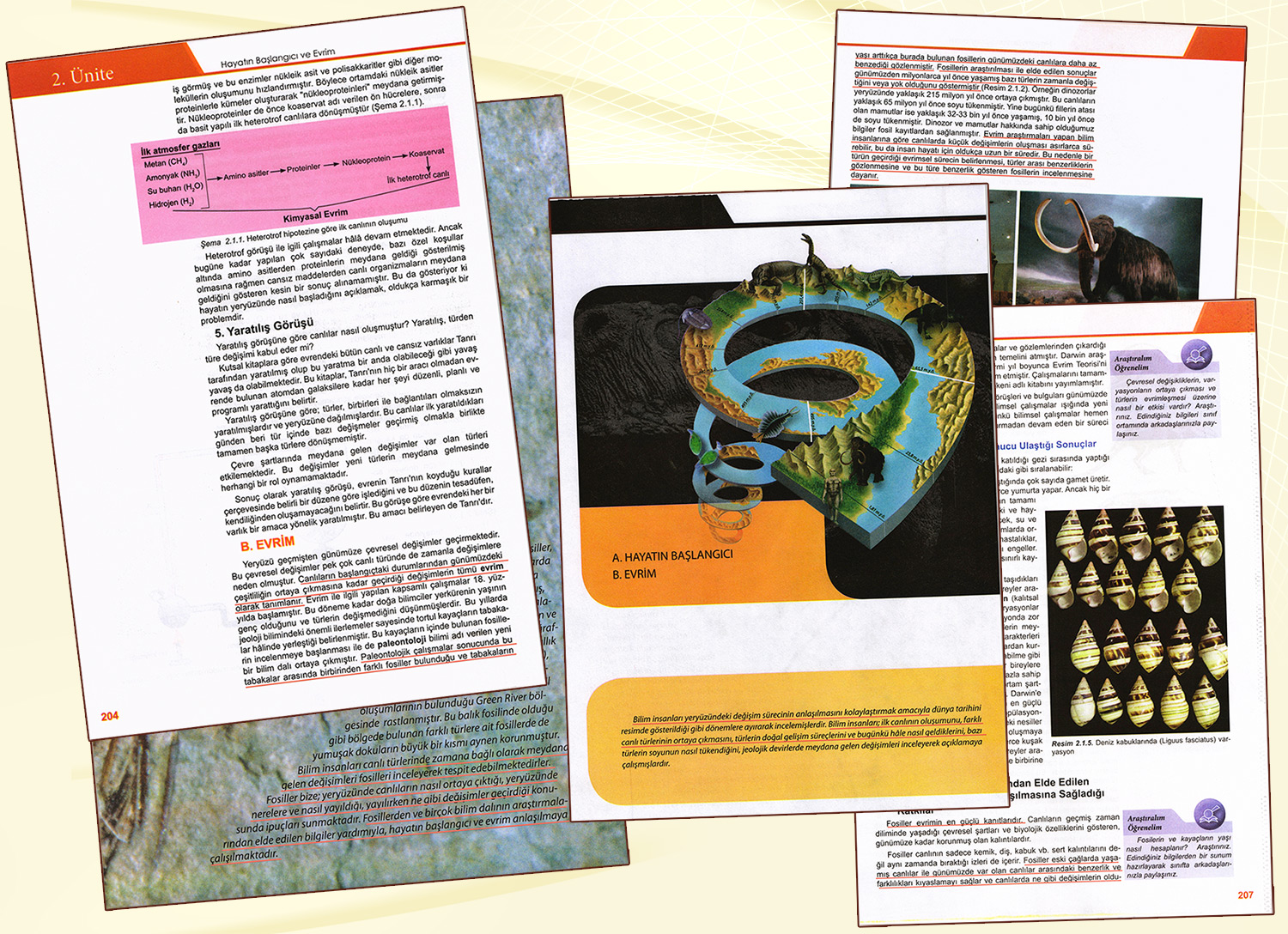
|
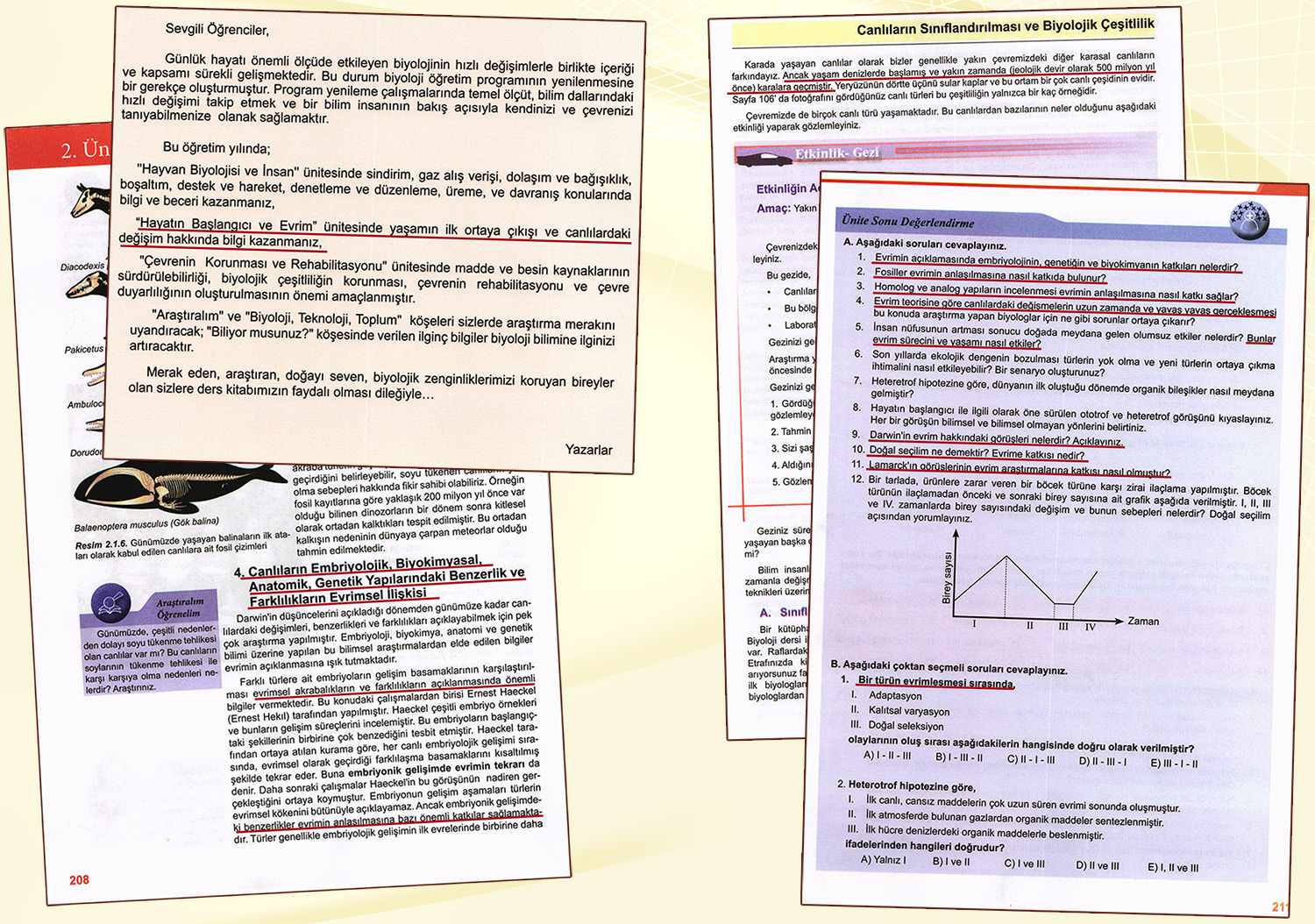
|
3. Concepts of democracy and the institution of the state under the mask of imperialism
Following attacks on Eruh and Şemdinli on August 15th, 1984, the PKK, whose declared aim was the establishment of an “Independent United Socialist Kurdistan”, officially announced its intention to remove the Turkish Army from the whole of the Southeastern Turkey. It maintained that aim until the early 1990s, and Öcalan announced that they would have an army numbering 50,000.58
One of the principle aims in the PKK’s founding manifesto is the creation of a classless society, and it contains a call to arms to build a communist Kurdistan. As stated previously, the section of the PKK program titled “The Duties of the Kurdistan Revolution”, contains an article verbalizing the rejection of all proposals for a solution (such as regional autonomy) that might be suggested by the Republic of Turkey, described as a colonialist state. The aim behind that rejection is the idea which states that Turkey, regarded as a colonialist state, should definitely be broken up.59
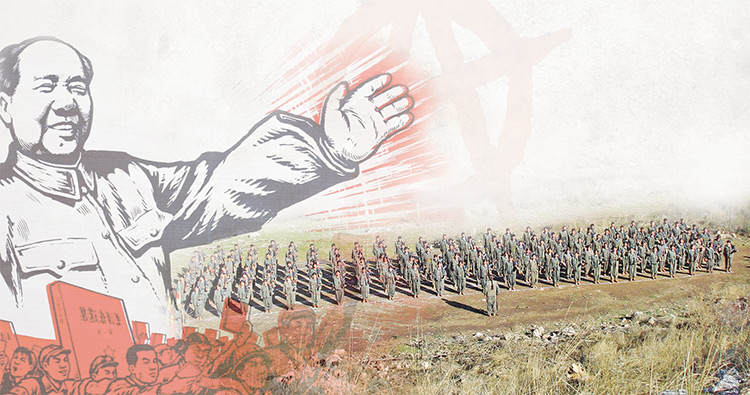
|
|
Öcalan's fundamental objective is to establish a 50,000-member army and seize the Southeast of Turkey through a Maoist guerrilla war. The imperialist mask is a deception. There is in fact no change in that objective. |
As the purpose behind its foundations demands, the PKK has therefore never sought a democratic solution. The communist ideology is based not on obtaining land or rights through negotiation under a democratic framework, but on achieving them directly through armed struggle. In such a way of thinking, in which the structure of the state is rejected and everything belonging to the state is considered the enemy, anarchy is seen as the sole legitimate method, and even the killing of innocent people in the name of changing the existing order is seen as perfectly normal. Democracy is therefore a totally unacceptable concept to all communist terror organizations.
The PKK openly states in its Manifesto that it intends to destroy that Turkish state through a Maoist-inspired war. The organization knows no methods other than terror, and has explicitly declared war on democracy and the state, as required under communism. However, it has gradually begun adopting a different language, as a result of its imperialist mask. The idea of demolishing the Republic of Turkey with an army of 50,000 has gradually been amended through a series of maneuvers and there is now talk of the absolute existence of the Republic of Turkey.
The main reasons for this are as follows:
- Despite adopting the tactic of a cowardly guerrilla war, the PKK has consistently suffered major losses at the hands of the Turkish military, and thus finds it difficult to recruit supporters.
- Öcalan’s words stating that “I’m at the disposal of the state” immediately after his arrest is in fact a clear expression of that forced change. Öcalan spoke directly to the state and issued statements to the effect that there would be negotiations with the state, and he reiterated these during his trial. It is obvious that Öcalan’s capture and the events that took place subsequently are part of a comprehensive and secret plan on the part of the Western deep state apparatus in the name of its aim of establishing a Great Kurdistan. As a part of this plan that was set out beforehand, Öcalan changed his language as determined by the West and came to reluctantly recognize the existence of the Turkish state.
- This imperialist policy, which began when the armed struggle failed to produce results, gradually turned into an endeavor to slyly take over the whole of the Southeastern Turkey. It started with the idea of first forcing the Turkish government to the negotiating table. In order to do that, it began concentrating on democratic talk instead of Marxist slogans that would only create an allergic reaction.
- BDP/HDP leaders who reacted negatively to the very word “democracy” before suddenly became its greatest supporters. Indeed, what Sırrı Süreyya Önder said during a television show is particularly noteworthy – “The PKK is a very democratic organization. These words may astonish many viewers, but that is the truth”. 60 To describe a terror organization that has been waging a cowardly guerrilla war for the last 40 years and has ridden roughshod over the principles of democracy by slaughtering people, making no allowances for women and children, as democratic, clearly reveals the kind of stratagem being played out.
- The PKK is certainly well aware that talk of democracy will attract powerful support from the U.S. and the EU in particular. And that is just what is happening. Certain naïve Westerners who describe the PKK terror in Turkey as “a Kurdish movement undergoing a crisis of identity” are immediately taken in by this talk of democracy and entirely forget the reality of the terror in Turkey instantly under the influence of that spell. The PKK is making masterly use of this sensitivity of the Western world.
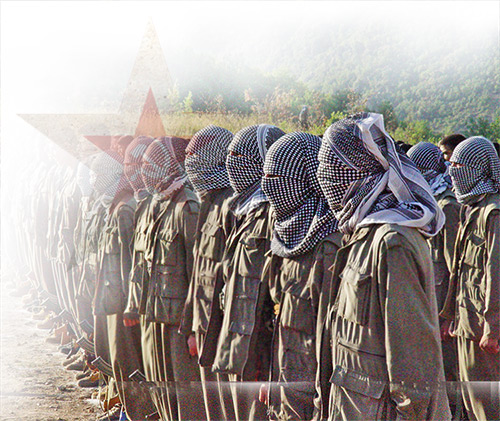
|
The organization that has begun repeating the word democracy so often also changed its name to Kongra-Gel as of November 2003 for all these reasons and described its subsequent objective as one of “building a democratic, ecological society in which democracy directly prevails, without seeking to found a separate state, for the resolution of the Kurdish problem”. 61 As a manifestation of that, the objective has moved from an independent Kurdistan to cantons, and from cantons to talk of democratic autonomy and now a Kurdistan within the territory of the Republic of Turkey is being discussed.
The fact is, however, that the aim here has never been democracy or democratic autonomy within a democratic country: The objective is to use democracy to get the inside track. It is to use local administrations to seize control of the Southeast, which they have been unable to break away by armed force, while at the same time espousing the integrity of the Republic of Turkey and also enjoying revenues from the Republic of Turkey and benefitting from its army, educational system and resources and thus grow stronger and be able to act on its own. In order to bring that about, it of course suits their interests to be under the protection of an existing and powerful state. They plan to use the Turkish army to establish local control for themselves. In doing all this, they will have no objection to the Turkish flag flying in a corner for a short period of time.
Since doing all this while talking of Kurdistan alone would stick out enormously, they have developed a new tactic and now plan to divide Turkey into 25 or 26 autonomous regions; this is the plan that the PKK and the political parties enjoying the support of Öcalan and the PKK, such as the HDP, have been making frequent reference to of late. The plan envisages every region becoming autonomous, and this will divert attention from the emergence of an autonomous Kurdistan.
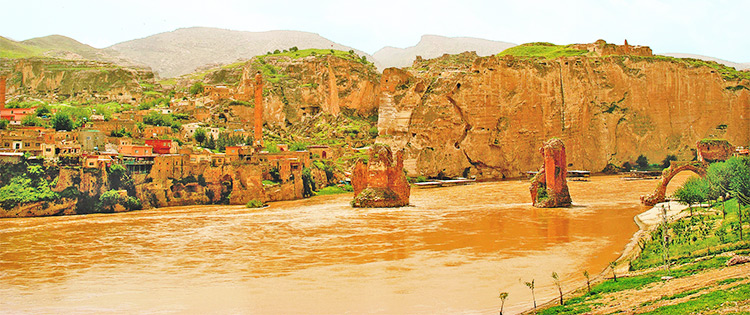
|
|
This country belongs to us all, and we will never allow it to be broken up. The course that best becomes us is to live as brothers. Above: A glorious view from Batman. |
This entire plan can be clearly seen in a speech given by Osman Baydemir, former mayor of Diyarbakır, in 2010:
What form will a democratic, prosperous Turkey take? There will be an autonomous Eastern Back Sea region, and autonomous Central Black Sea region, and also an autonomous Kurdistan... The Turkish Parliament exists and will continue to exist within this project of democratic autonomy. There is no objection to that. The Turkish flag will continue to fly in Turkey, and we have no objection to that, either. However, there will be an autonomous parliament in each region. One of these regional parliaments will be the Kurdistan Regional Parliament. In addition to the Turkish flag, for which my forebears and all our forebears sacrificed their blood and which is now flying, the local colors and flag will also be flying in the sky. Where is the harm in our yellow, red and green flag flying alongside the Turkish flag outside our municipal building? 62 (Milliyet, 01.08.2010)
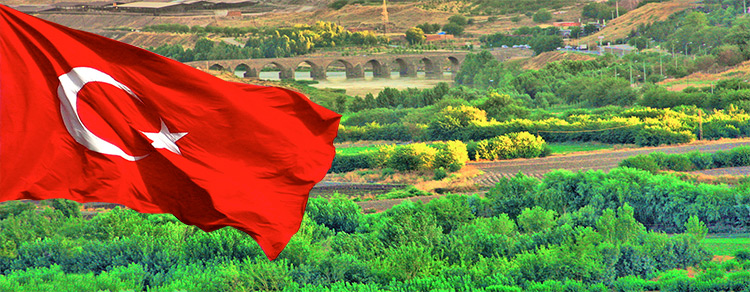
|
|
Those treacherous forces that would bring the Turkish flag down anywhere in the country will always encounter the resistance of the Turkish nation. This country is not destined to be broken up. Above: A view from Diyarbakır |
We also need to point out the means of persuasion employed in these statements. Baydemir, in his own mind, “permits” the continued existence of the Turkish Parliament and Turkish flag, and thus supposedly reveals his good intentions. This form of reckless language has recently been adopted by almost all senior HDP figures, who say “there is no harm in the Turkish flag -which actually is an expression of the indivisibility of our motherland- flying in a corner somewhere”.
It also needs to be made clear that some BDP-HDP representatives, including Osman Baydemir, may indeed be speaking in this way with no ulterior motives, or else under pressure. Yet when it comes to the aims of the PKK, the idea underlying all the talk of democratic autonomy, and cantons is the planned Kurdish state in the Southeast. The aim is also to use the wealth, means and troops of the Turkish state to make that plan a reality. Indeed, the fact that the PKK was until quite recently in “negotiations” with the Turkish state was intended to obtain by cunning stratagem what it has failed to obtain through its guerrilla campaign. This will be examined in more detail in due course.
Footnotes
21. Questions & Answers to American Trade Unionists: Stalin's Interview With the First American Trade Union Delegation to Soviet Russia, Pravda, September 15, 1927; http://www.marxists.org/reference/ archive/stalin/works/1927/09/15.HTM
22. Dr. Fred C. Schwarz, Komünistler Nasıl Yalan Söyler [You Can Trust the Communists (to be Communists)], pp. 215-216
23. Necati Alkan, PKK'da Semboller, Aktörler ve Kadınlar (Symbols, actors and women in the PKK), 2012, Karakutu Yayınları, pp. 21-22
24. Ibid., pp. 77-78
25. Abdullah Öcalan, Nasıl Yaşamalı (How to live), p. 91
26. Necati Alkan, PKK'da Semboller, Aktörler ve Kadınlar (Symbols, actors and women in the PKK), 2012, Karakutu Yayınları, pp. 71-72
27. Ibid., pp. 71-72
28. Global Masculinities and Manhood, What makes a man within his own culture, University of Illinois Press, 2013, p. 95
29. Necati Alkan, PKK'da Semboller, Aktörler ve Kadınlar (Symbols, actors and women in the PKK), 2012, Karakutu Yayınları, p. 104
30. Ibid., p. 256
31. Ibid., p. 256
32. Ibid., p. 258
33. Ibid., p. 91
34. Ibid., pp. 100-101
35. Ibid., p. 103
36. Özgür Yaşamla Diyaloglar (Dialogues with the Free Life), October 2002, p. 257
37. Sümer Rahip Devletinden Demokratik Uygarlığa (From the Priestly Sumerian State to Democratic Civilization), Vol. 1, December 2001, p. 204
38. Ibid., p. 313
39. Ibid., p. 354
40. Lenin, Collected Works, vol. 15, pp. 402-413, "The Attitude of the Workers' Party to Religion," May 13 (28), 1909.
41. http://www.haber365.com/Haber/Ocalan_Islam_ Kurtler_Icin_Truva_Ati/
42. Burhan Semiz, PKK ve KCK'nın Din Stratejisi (The Religious Strategy of the PKK and KCK), p. 115
43. Ibid., p. 111
44. Ibid., pp. 125-126
45. http://www.washingtonpost.com/blogs/worldviews/wp/2014/10/27/turkey-still-thinks-this-guy-holding-a-baby-bear-is-a-terrorist-is-he
46. Burhan Semiz, PKK ve KCK'nın Din Stratejisi (The Religious Strategy of the PKK and KCK), p. 101
47. Ibid., pp. 95-96
48. Ibid., pp. 125-126
49. Ibid., p. 132
50. Ibid., pp. 188-189
51. Ibid., pp. 189-190
52. Ibid., p. 135
53. Ibid., p. 112
54. Ibid., p. 135
55. Ibid., p. 135
56. MEB, Sosyoloji ders kitabı (Ministry of Education, Sociology text book), p. 96
57. MEB, Felsefe ders kitabı (Ministry of Education, Philosophy text book), p. 171
58. Ümit Özdağ, PKK ile Pazarlık (Negotiating with the PKK), Kripto Yayıncılık, 2013, p. 15
59. Elif Çalışkan Polat, PKK Terör Örgütüne Dış Destek (Foreign Support for the PKK Terror Organization), Çatı Kitapları, 2013, p. 34
60. http://www.milliyet.com.tr/onder-pkk-cok-demokratik-bir-yapi/siyaset/detay/2022602/default. htm
61. Elif Çalışkan Polat, PKK Terör Örgütüne Dış Destek (Foreign Support for the PKK Terror Organization), Çatı Kitapları, 2013, p. 35
62. Ümit Özdağ, PKK ile Pazarlık (Negotiating with the PKK), Kripto Yayıncılık, 2013, p. 178
5 / total 11
You can read Harun Yahya's book America’s Failure to Perceive the PKK online, share it on social networks such as Facebook and Twitter, download it to your computer, use it in your homework and theses, and publish, copy or reproduce it on your own web sites or blogs without paying any copyright fee, so long as you acknowledge this site as the reference.